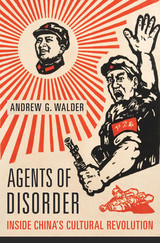
Why did the Chinese party state collapse so quickly after the onset of the Cultural Revolution? The award-winning author of China Under Mao offers a surprising answer that holds a powerful implicit warning for today’s governments.
By May 1966, just seventeen years after its founding, the People’s Republic of China had become one of the most powerfully centralized states in modern history. But that summer everything changed. Mao Zedong called for students to attack intellectuals and officials who allegedly lacked commitment to revolutionary principles. Rebels responded by toppling local governments across the country, ushering in nearly two years of conflict that in places came close to civil war and resulted in nearly 1.6 million dead.
How and why did the party state collapse so rapidly? Standard accounts depict a revolution instigated from the top down and escalated from the bottom up. In this pathbreaking reconsideration of the origins and trajectory of the Cultural Revolution, Andrew Walder offers a startling new conclusion: party cadres seized power from their superiors, setting off a chain reaction of violence, intensified by a mishandled army intervention. This inside-out dynamic explains how virulent factions formed, why the conflict escalated, and why the repression that ended the disorder was so much worse than the violence it was meant to contain.
Based on over 2,000 local annals chronicling some 34,000 revolutionary episodes across China, Agents of Disorder offers an original interpretation of familiar but complex events and suggests a broader lesson for our times: forces of order that we count on to stanch violence can instead generate devastating bloodshed.

During and after the Cultural Revolution, radical leaders in the Chinese Communist Party tried to mobilize rural society for socioeconomic and political changes and move rural China to even higher stages of collectivism. David Zweig argues that because advocates of agrarian radicalism formed a minority group within China’s central leadership, they acted in opposition to the dominant moderate forces and resorted to alternative strategies to mobilize support for their unofficial policies. The limited institutionalization of the system allowed the radicals to promote their principles through “policy winds,” speeches generated by newspaper articles, networks of political allies, and organized visits; they also linked their policies to ongoing political and economic campaigns. In spite of this radical ideology and frequent upheavals in the countryside, Zweig finds that Chinese peasants had no ideological affinity for Mao’s theory of the continuing revolution and reacted to each policy change on the basis of how it affected their personal, family, or collective interests. Despite intense propaganda, cadres adjusted the impact of these radical policies so that the peasants’ conservative mindset, entrepreneurial spirit, and desire to improve their own lot remained intact.
Zweig examines the local realities of the radicals’ program by describing the results of specific policies; he discriminates among the responses of officials at different bureaucratic levels, peasants of varying income levels and family structures, and villages with specific geographic and socioeconomic characteristics. He draws on his own field research in Chinese villages and interviews with Chinese college students and their friends who had lived in the countryside and emigrés in Hong Kong who had lived and worked in rural China.
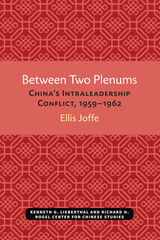

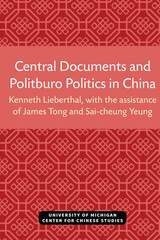
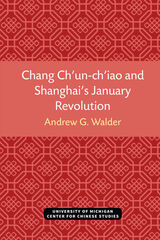
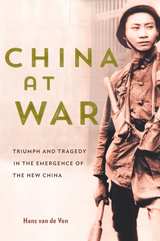
China’s mid-twentieth-century wars pose extraordinary interpretive challenges. The issue is not just that the Chinese fought for such a long time—from the Marco Polo Bridge Incident of July 1937 until the close of the Korean War in 1953—across such vast territory. As Hans van de Ven explains, the greatest puzzles lie in understanding China’s simultaneous external and internal wars. Much is at stake, politically, in how this story is told.
Today in its official history and public commemorations, the People’s Republic asserts Chinese unity against Japan during World War II. But this overwrites the era’s stark divisions between Communists and Nationalists, increasingly erasing the civil war from memory. Van de Ven argues that the war with Japan, the civil war, and its aftermath were in fact of a piece—a singular process of conflict and political change. Reintegrating the Communist uprising with the Sino-Japanese War, he shows how the Communists took advantage of wartime to increase their appeal, how fissures between the Nationalists and Communists affected anti-Japanese resistance, and how the fractious coalition fostered conditions for revolution.
In the process, the Chinese invented an influential paradigm of war, wherein the Clausewitzian model of total war between well-defined interstate enemies gave way to murky campaigns of national liberation involving diverse domestic and outside belligerents. This history disappears when the realities of China’s mid-century conflicts are stripped from public view. China at War recovers them.
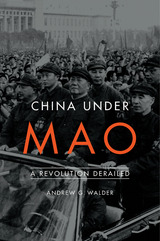
China’s Communist Party seized power in 1949 after a long period of guerrilla insurgency followed by full-scale war, but the Chinese revolution was just beginning. China Under Mao narrates the rise and fall of the Maoist revolutionary state from 1949 to 1976—an epoch of startling accomplishments and disastrous failures, steered by many forces but dominated above all by Mao Zedong.
“Walder convincingly shows that the effect of Maoist inequalities still distorts China today…[It] will be a mind-opening book for many (and is a depressing reminder for others).”
—Jonathan Mirsky, The Spectator
“Andrew Walder’s account of Mao’s time in power is detailed, sophisticated and powerful…Walder takes on many pieces of conventional wisdom about Mao’s China and pulls them apart…What was it that led so much of China’s population to follow Mao’s orders, in effect to launch a civil war against his own party? There is still much more to understand about the bond between Mao and the wider population. As we try to understand that bond, there will be few better guides than Andrew Walder’s book. Sober, measured, meticulous in every deadly detail, it is an essential assessment of one of the world’s most important revolutions.”
—Rana Mitter, Times Literary Supplement


In February 1967, at the height of the Cultural Revolution, the American Society of International Law organized a study panel of legal scholars, social scientists, lawyers, and government officials to consider problems relating to “China and International Order.” The panel was founded in the belief that the turmoil in China would not endure and that the People's Republic might soon wish to participate fully in the world community. To prepare for this day, the panel commissioned and reviewed a number of studies of China's interpretation and application of international law.
The ten essays in this volume—written by twelve scholars including Jerome Alan Cohen, who has also written a substantial introduction—are the fruit of this effort. Four of the essays deal with basic problems relating to Peking's international conduct: recognition and the establishment of diplomatic relations, the regulation of foreign diplomats serving in China, manipulation of the concept of “unequal treaties,” and the PRC's conditions for participation in international organizations. The other six essays focus on legal problems that have arisen in China's relations with a given country or international organization.
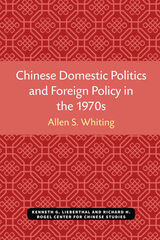
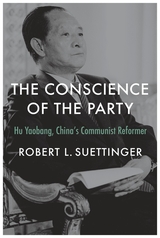
The definitive story of a top Chinese politician’s ill-fated quest to reform the Communist Party.
When Hu Yaobang died in April 1989, throngs of mourners converged on the Martyrs’ Monument in Tiananmen Square to pay their respects. Following Hu’s 1987 ouster by party elders, Chinese propaganda officials had sought to tarnish his reputation and dim his memory, yet his death galvanized the nascent pro-democracy student movement, setting off the dramatic demonstrations that culminated in the Tiananmen massacre.
The Conscience of the Party is the comprehensive, authoritative biography of the Chinese Communist Party’s most avid reformer and its general secretary for a key stretch of the 1980s. A supremely intelligent leader with an exceptional populist touch, Hu Yaobang was tapped early by Mao Zedong as a capable party hand. But Hu’s principled ideas made him powerful enemies, and during the Cultural Revolution he was purged, brutally beaten, and consigned to forced labor. After Mao’s death, Hu rose again as an ally of Deng Xiaoping, eventually securing the party’s top position. In that role, he pioneered many of the economic reforms subsequently attributed to Deng. But Hu also pursued political reforms with equal vigor, pushing for more freedom of expression, the end of lifetime tenure for CCP leaders, and the dismantling of Mao’s personality cult. Alarmed by Hu’s growing popularity and increasingly radical agenda, Deng had him purged again in 1987.
Historian and former intelligence analyst Robert L. Suettinger meticulously reconstructs Hu’s life, providing the kind of eye-opening account that remains impossible in China under state censorship. Hu Yaobang, a decent man operating in a system that did not always reward decency, suffered for his principles but inspired millions in the process.
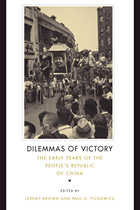
This illuminating work examines the social, cultural, political, and economic dimensions of the Communist takeover of China. Instead of dwelling on elite politics and policy-making processes, Dilemmas of Victory seeks to understand how the 1949-1953 period was experienced by various groups, including industrialists, filmmakers, ethnic minorities, educators, rural midwives, philanthropists, stand-up comics, and scientists.
A stellar group of authors that includes Frederic Wakeman, Elizabeth Perry, Sherman Cochran, Perry Link, Joseph Esherick, and Chen Jian shows that the Communists sometimes achieved a remarkably smooth takeover, yet at other times appeared shockingly incompetent. Shanghai and Beijing experienced it in ways that differed dramatically from Xinjiang, Tibet, and Dalian. Out of necessity, the new regime often showed restraint and flexibility, courting the influential and educated. Furthermore, many policies of the old Nationalist regime were quietly embraced by the new Communist rulers.
Based on previously unseen archival documents as well as oral histories, these lively, readable essays provide the fullest picture to date of the early years of the People's Republic, which were far more pluralistic, diverse, and hopeful than the Maoist decades that followed.

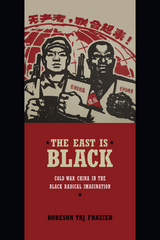
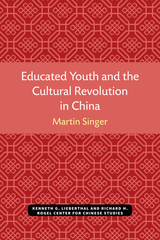

Both a memoir and a documentary history of the Chinese revolution from 1949 through the Cultural Revolution, The Man Who Stayed Behind provides a human perspective on China’s efforts to build a new society. Critical of both his own mistakes and those of the Communist leadership, Rittenberg nevertheless gives an even-handed account of a country that is now free of internal war for the first time in a hundred years.
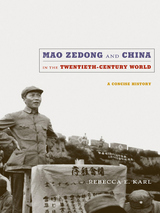
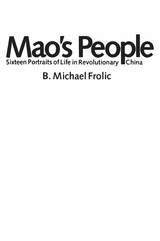
"How do we apply Chairman Mao's Thought to get fat pigs?" Squad Leader Ho (who knew the most about pigs) replied that, according to Chairman Mao, one must investigate the problem fully from all sides, and then integrate practice and theory. Ho concluded that the reason for our skinny pigs had to be found in one of three areas: the relationship between the pigs and their natural environment (excluding man); the relationship between the cadres and the pigs; and the relationship among the pigs themselves.
And so the city slickers, sent down to the countryside for political reeducation, set out to find the Thousand-Dollar Pig, much to the bemusement of the local peasants.
The sixteen stories collected in this remarkable book give firsthand accounts of daily life in contemporary China. From 250 interviews conducted in Hong Kong between 1972 and 1976, Mr. Frolic has created charming vignettes that show how individuals from all parts of China led their lives in the midst of rapid social change and political unrest. We hear about oil prospectors, rubber growers, and factory workers, Widow Wang and her sit-in to get a larger apartment, the thoroughly corrupt Man Who Loved Dog Meat, the young people who flew kites to protest antidemocratic tendencies.
As fresh and original as the individual accounts are, common and timeless themes emerge: the sluggishness of an agrarian society in responding to modernization; the painful lack of resources in a poor and gigantic country; the constraints imposed on common people by the bureaucracy; the way in which individuals outwardly support the system and inwardly resist it; the limitations of heavy and conflicting doses of ideology in motivating individuals.
But there are also recurrent motifs of economic and social progress: production rises, illiteracy declines, and socialist values have impact. A new China has emerged, though change is occurring far more slowly than its leaders had intended.
Mao's People contains much new information on China both for the general reader and for specialists in the field. Above all, it is a completely engrossing and vivid glimpse into the ways of a nation we are only beginning to discover.

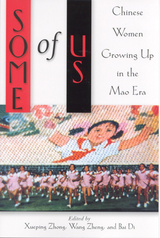
What does it mean to have grown up female in the Mao era? How can the remembered details of everyday life help shed light upon those turbulent times?
Some of Us is a collection of memoirs by nine Chinese women who grew up during the Mao era. All hail from urban backgrounds and all have obtained their Ph.D.s in the United States; thus, their memories are informed by intellectual training and insights that only distance can allow. Each of the chapters—arranged by the age of the author—is crafted by a writer who reflects back to that time in a more nuanced manner than has been possible for Western observers. The authors attend to gender in a way that male writers have barely noticed and reflect on their lives in the United States.
The issues explored here are as varied as these women’s lives: The burgeoning rebellion of a young girl in northeast China. A girl’s struggles to obtain for herself the education her parents inspired her to attain. An exploration of gender and identity as experienced by two sisters.
Some of Us offers insight into a place and time when life was much more complex than Westerners have allowed. These eloquent writings shatter our stereotypes of persecution, repression, victims, and victimizers. Together, these multi-faceted memoirs offer the reader new perspectives as they daringly explore difficult—and fascinating—issues.

From 1949 to 1978, communist elites held clashing visions of China’s economic development. Mao Zedong advocated the “first way” of semi-autarchy characteristic of revolutionary Stalinism (1929–34), while Zhou Enlai adapted bureaucratic Stalinism (1934–53) to promote the “second way” of import substitution industrialization. A Third Way tells the story of Deng Xiaoping’s experimentation with export-led development inspired by Lenin’s New Economic Policy and the economic reforms of Eastern Europe and Asia.
Having uncovered an extraordinary collection of internal party and government documents, Lawrence Reardon meticulously traces the evolution of the coastal development strategy, starting with special economic zones in 1979 and evolving into the fourteen open coastal cities, the Hainan SEZ, and eventual accession to the global trade regime in 2001. Reardon details how Deng and Zhao Ziyang tackled large-scale smuggling operations, compromised with Chen Yun’s conservative views, and overcame Deng Liqun’s ideological opposition. Although Zhao Ziyang was airbrushed out of official Chinese history after June 4, 1989, Reardon argues that Zhao was the true architect of China’s opening strategy. A Third Way provides important new insights about the crucial period of the 1980s and how it paved the way for China’s transformation into a global economic superpower.

The first comprehensive study of the lifework of Guo Moruo (1892–1978) in English, this book explores the dynamics of translation, revolution, and historical imagination in twentieth-century Chinese culture. Guo was a romantic writer who eventually became Mao Zedong’s last poetic interlocutor; a Marxist historian who evolved into the inaugural president of China’s Academy of Sciences; and a leftist politician who devoted almost three decades to translating Goethe’s Faust. His career, embedded in China’s revolutionary century, has generated more controversy than admiration. Recent scholarship has scarcely treated his oeuvre as a whole, much less touched upon his role as a translator.
Leaping between different genres of Guo’s works, and engaging many other writers’ texts, The Translatability of Revolution confronts two issues of revolutionary cultural politics: translation and historical interpretation. Part 1 focuses on the translingual making of China’s revolutionary culture, especially Guo’s translation of Faust as a “development of Zeitgeist.” Part 2 deals with Guo’s rewritings of antiquity in lyrical, dramatic, and historiographical-paleographical forms, including his vernacular translation of classical Chinese poetry. Interrogating the relationship between translation and historical imagination—within revolutionary cultural practice—this book finds a transcoding of different historical conjunctures into “now-time,” saturated with possibilities and tensions.
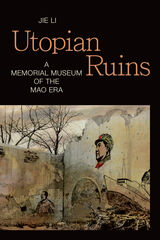

Yenching University was perhaps the most impressive example of Sino-Western cooperation in the twentieth century. From its founding in 1916 by Western missionaries until the Communist victory, Yenching mirrored the colorful and frustrating efforts of Chinese and Western liberals to find solutions to China's overriding preoccupation with national salvation. In charting the ebb and flow of university life, this definitive work sheds light on the intellectual, social, and diplomatic forces at work in this transitional period in Chinese history.
Philip West's analysis of the Yenching episode is carefully placed within the political context, both domestic and foreign, of the Republican years (1912–1949). But the author sees intercultural history as being more than an extension of politics and diplomacy. The early bond between Chinese and Westerners at Yenching, despite its fame as an educational institution, was a religious one. Rising national consciousness, student radicalization, and China's unending experience of war weakened that religious tie. And yet religious purposes are a part of the Yenching story to the end.
In his handling of intercultural history, West has a keen appreciation for the interplay of political forces and individuals. The demise of Yenching and the breakdown of Sino-Western relations generally are seen in terms of the individual behavior of Yenching personalities, the pressures of Communist ideology, and also Western diplomacy surrounding the Korean War. Throughout this study major attention is given to the pivotal role of that towering personality in Sino-Western relations, John Leighton Stuart, Yenching's longtime president and the last American Ambassador to China prior to the Communist takeover.
READERS
Browse our collection.
PUBLISHERS
See BiblioVault's publisher services.
STUDENT SERVICES
Files for college accessibility offices.
UChicago Accessibility Resources
home | accessibility | search | about | contact us
BiblioVault ® 2001 - 2024
The University of Chicago Press









